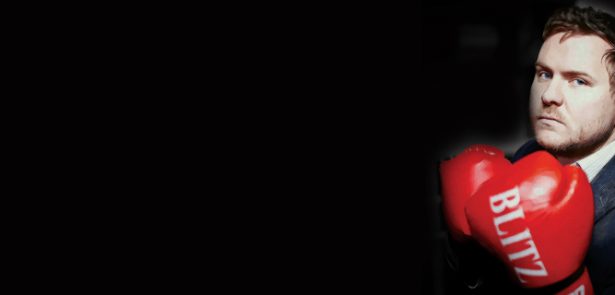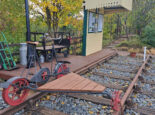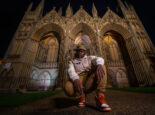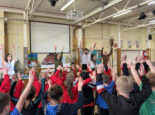Mark Grist: do the write thing

Mark Grist is a poet, educator and former Peterborough English teacher who shot to national fame in 2011 when his win against MC Blizzard in a Don’t Flop rap battle went viral. It has become one of the most viewed UK vs UK rap battles of all time, with over 5 million views to date. Toby Venables talks to him about what he has learned from rap culture, why we must listen to our young people and what goes on at Peterborough’s latest poetical slugfest: Write Club.
There’s a great film on your website called A teacher, eh? about how people responded to you when they heard you were a teacher. But how do people respond now when they learn that you’re a poet?
I think a lot of people feel that poetry is a lofty, isolated and academic pursuit which is not really for them. I get a lot of people saying ‘I’m too thick to understand poetry…’ Which is bonkers! Being poetic is really just wringing a little extra meaning out of language. A really good best man’s speech can be poetry. Or a really good stand-up routine. A great song. If you’re using language and you’re getting the most out of it, there can be poetry in it. I actually really like doing things where I’m subservient to the audience. Me and Mixy – a local hip hop MC who is the other half of my Dead Poets act – did a thing where we wore little plastic aprons and spent a lunchtime writing poems for anyone who came along. Basically people could come up and order a poem, just like they were ordering a kebab. But poetry is dominated by white, middle-class males – or certainly a lot of the gatekeepers in academia are of that type. They perpetuate the same gender, the same class, the same skin colour, the same types of intelligence, and while people are told they’re supposed to respect poetry, they’re not really that engaged. I think that’s a real pity. For it to move forward, those people in those positions probably have to accept that they need to lose a little bit of control.
Do you see that happening?
Actually, it is happening. There’s some really cool spoken word going on. Grime is really exciting. Young people are actually ahead of the curve as far as literacy goes. We’re trying to catch up with them, because we haven’t communicated very effectively with our young people in relation to language. We’ve been too keen to dictate what we believe is the correct way and the incorrect way to use language. We tell them that certain forms of writing are of higher value than others, and they look around and say: ‘Hang on, this form of writing is everywhere. All my mates are into it…’ So we’ve got a bit of a breakdown of communication, I think. But then you get cool stuff like Grime coming out, and huge leaps forward with online social media communication, vlogging, YouTube – lots of people finding new ways to use words and engage with each other.
One of those is rap battling, which has become massive online phenomenon. Tell me how and why you got involved in that.
I wanted to learn more about hip hop, because the teenage students I work with are so interested in it. I’d started working with Mixy, a local hip hop MC, and we thought we’d swap art forms for a year and coach each other. So Mixy applied to be poet laureate of Peterborough. At that point he was working in a call centre and part of a local group called Locality. I was teaching and had been the poet laureate of Peterborough, and was writing poems and running a poetry night in my spare time. So I just started going down to Dissident in Peterborough and competing in these rap battles. I was really scared about doing it, but then found out that they don’t freestyle much any more in battling. It used to be very freestyle, but with YouTube people wanted to have consistent content. When people are freestyling it can drag in places, but if people pre-write their content it can be really interesting. So I realised it was basically like writing a really offensive poem about someone. I could do that! I liked the pugilistic side of it, too. Physically, I probably couldn’t engage in a boxing match, but I’ve always been good with language, and always loved it, so it was like discovering there was this form of bare-knuckle boxing that I could actually do. I like the fact that it hurts, too. When you lose, it hurts. You really are thinking on your feet, it’s stressful, but I like that sporting element of it.
“I started battling at Dissident secretly when I was still teaching, and I was really nervous about that.”
Some of it is pretty harsh stuff. Are there rules – limits to what you can say?
It is an underbelly art form, with no rules. There is a time limit, but within that you can say anything that you want. But there’s almost like a code with top-level battlers. It would be very unlikely for anybody in a rap battle to reference the Manchester bombing, for example, because the crowd would turn on them. I have seen rap battles where someone has said something where the whole crowd has said ‘That’s not OK…’ You win by your more intelligent and complex use of language, but also by destroying your opponent’s credibility and status. Often that’s by exposing faults in their character. You can talk about physical traits – but they only go so far. The things that really land are where you point out where they have claimed to be something they’re not, or where they’ve done something morally repugnant. When I started battling I got really frustrated with people using homophobic insults, and I actually called some guys out in a battle – me and Mixy had a double match – and I used that whole angle, accusing them of being homophobic, and it was odd seeing that being processed in a rap battle space. But now, that approach is being used quite regularly, and homophobic content doesn’t fly any more. You can see how society has moved on in ten years.
Is there ever a danger it could spill over into actual violence?
It’s totally non-violent. It’s extremely rare for anything to kick off at a battle event. It is a way for people to deal with aggression that is actually very disciplined; top end battlers don’t have time for petty, squabbling stuff. Before a battle I usually contacted my opponent to find out if there was anything they really didn’t want me to mention – because I’ve had battlers tell me about personal issues, with depression, with their families, medical problems. I want to beat someone because I’m better at connecting with an audience and using words to outwit them. That’s how I want to win, and most people are like that. I still see things I don’t like in battles, but also think it’s a good thing to be offended sometimes. It’s important to be offended. I worry sometimes that we’re being led to believe there’s no room in life for offence, which I think is dangerous. Everyone should be allowed to control what they experience in their own sitting room. That’s fair enough. But as soon as you access space outside of that – or even the internet, to be honest – you are going out into a world where not everyone thinks the same way you do. To assume that if something offends you it shouldn’t exist is a bit worrying. And I like to feel those things being tested, at times. It would be awful if you agreed with everything you saw.
How did people outside the battling scene view what you were doing?
I started battling at Dissident secretly when I was still teaching, and I was really nervous about that. It is kind of odd being a teacher, and a poet, and a battle rapper – because teachers have certain views on poets, poets have certain views on battle rappers and battle rappers have certain views on teachers… A lot of poets were telling me it was a base art form, and that anyone could do it, which I thought was really funny because actually it’s incredibly complicated. And you do get some crap sometimes, because anybody CAN do it. If you want to battle someone, you can.
Do you get nervous before a battle?
It’s an incredibly stressful thing to do. I’m almost never scared of a gig these days, but I’ve had rap battles where I have genuinely wanted to run away. I remember telling my mate to push me into the room. I have never wanted to run away from anything as much as my battle with Blizzard.
What did you do when that battle was over?
We finished the battle and then had a really good laugh – just sat outside and had a chat about it and it was all cool. Then it went up online, and it went crazy. It eventually got over 5 million views, and there was a really big battle which had come out on Christmas Day which we were giving a run for its money. Within the battle community, which is huge, that was the battle of the year. Then it got spun out in the press as ‘Cocky teenager destroyed by his English teacher’. I didn’t teach him, though at the battle, because I had been a teacher and he was a sixth form student, they said ‘lean on the student/teacher angle’ – which was cool, because I was wearing a suit for the battle anyway.
“The suit was only going to be for the first couple of battles – I was going to wear a wetsuit and flippers.”
Was the suit a deliberate statement?
I’d always worn a suit. The suit was handy – it was kind of like armour. If they rip into you about your suit, they’re wasting material. They’re like superficial punches. What I thought was funny was that there was all this aggression, with them saying all this stuff they wanted to do to you, and all this supposed fearlessness, and yet everyone dresses the same way. It was almost like a uniform. So what I thought would be good would be to show a different kind of fearlessness by not dressing like that. The suit was only going to be for the first couple of battles – I was going to wear a wetsuit and flippers for one, to just keep making that point. But the suit stuck. I was annoyed how the press spun it when it went viral, though, because I was being celebrated as this adult who’d taught a gobby teenager a thing or two and shown him what real literature is. That really was the complete opposite of what I was doing. But it was everywhere – in the Star, the Mail, the Guardian. It was mad! I got asked on Big Brother, which was a bit odd. Film Four even wanted to make a feature about me going and battling Eminem. I had just left teaching as I went into that battle, studying creative writing at Goldsmiths and seeing what being a poet would be like, so I was struggling to make ends meet, and suddenly I was getting 30-40 emails a day from film companies, TV companies, record labels – everybody was wondering how they could make some money off of this.
What became of that Eminem film..?
It just fell away because it was such a bad idea. There was no way it was going to work – though apparently he was up for it.
How would you have fared, do you think?
I would have died! The guys who do it at world class level are as intelligent, when it comes to language, as university professors, they just haven’t had the hand dealt to them in life to go through those academic institutions. But the language they are using is so complex, so clever – I can’t do any of that stuff. What I’ve got is a couple of sweet moves, playing on the character of being a teacher and being older. I can talk about loft insulation and people will find it funny. Or I can make out like I’m disappointed in them and say I’m putting them in detention. But Eminem is unbelievable. It would be no contest. He would freestyle it as well. I would write for three weeks, rehearse it, then he’d turn up having done no prep, freestyle it and it would still be better than what I’d written.
Tell me about Write Club and how that came about…
I like the competitive pugilism of rap battles – a lot of the shows I’ve done with Mixy have been the two if us competing with each other – and when you have two sides competing like that it means that all the content is relevant all the way through. If someone is bombing, the other side is going to capitalise on it. The audience is up for watching quite a variety of stuff, and you can experiment. There are slams, which are competitive poetry events, but I thought we could do something funnier and lighter. So myself, Keely Mills and Charley Genever got together and talked about having a night where you have three team captains, and each team captain would assemble twenty minutes of poetry performance. The audience would be given poker chips, there would be a pint glass for each team and you put your poker chips into the glass of the team you like the most. You can give each team one, or give them all to one, but whoever gets the most chips at the end of the night gets free beer. At every Write Club event, the theme for the next event is also decided by an audience member. At the end, one audience member who has really engaged with it is chosen by the three teams. That makes it really funny, because no one knows what the poems are going to be about next time until the very end of that evening.
What themes have come up?
We’ve had ‘a better world is possible’ which was really lovely. We then had ‘how the **** did I get this old?’ It was someone’s birthday! Then we had ‘this one time in a bar’, and another was ‘I recognise you’. Someone had seen someone famous earlier that day, so that led to lots of pieces about famous people we’d met. So you have a very straightforward mechanic, and it means we are thinking all the time about how we are connecting with the audience, which I think is the number one rule for being a successful poet or spoken word artist. If you do that well, they will follow you through your life. So, Write Club is a free night of entertainment, but also a way helping young writers learn to connect with an audience.
It seems like poetry is really booming in the city…
We’ve got so much poetry going on in the city at the moment. Charley Genever, Peterborough’s current poet laureate, is doing incredible things. She’s been putting on loads of stuff – and I see people performing at open mics who I met when I came in to deliver a workshop to their class, when they were in year nine or ten. It’s amazing to see people at these events who have moved into it over the past five or ten years just because of the poetry community and what’s been going on.
“There is this idea that teacher’s aren’t supposed to learn any more, they’re just supposed to teach. But you’re always learning.”
Even if they choose not to be poets or writers, does this develop valuable communication skills?
Yes, 100%. When you work with young people, you find some get the results they want and go off to uni. But then others don’t get the results they want and are like ‘My life is over!’ But the one thing you’ve got, no matter what other qualifications you have, is your ability to communicate with other people. I was in Indonesia recently, working in a school which is basically for kids whose parents live in a nearby shanty town, and the kids – some of them as young as six – work on the rubbish tip, scavenging for whatever they can take home. I loved it, but I realised very quickly that one of the best things I could do was just teach them how to shake hands and make eye contact. That kind of stuff is so important, especially now young people here are spending so much time communicating via screens and not face to face. If you’re lucky enough go to certain schools you get taught debating skills and things like that – but I really think that your ability to communicate dictates the amount of freedom that you have in life, and the extent to which you feel connected to those around you.
Teaching all comes down to communication. Subject knowledge is obviously really important, but people really underestimate how important the ability to communicate with other people is in schools. Michael Rosen put it really well, saying that in the old educational model the teacher is like a jug full of water and the kids are empty glasses. The idea is the teacher just fills them up with knowledge. The problem with that, he said, is that no kid is an empty glass; they’ve all got things that they think and experience themselves, and it’s much more interesting to share a bit of water back and forth. There is this idea that teacher’s aren’t supposed to learn any more, they’re just supposed to teach. But you’re always learning.
I do worry a bit the way schools are going; I don’t feel like we are moving forward in how we communicate with young people and how we foster an enthusiasm and an excitement for the English language. There are many success stories, but those who have had a bad experience in education we often don’t hear from, because they haven’t been given the skills to speak out and make their voices heard. I just wish we would listen to young people more. So, listen to your kids, listen to your grandkids and consider their point of view.
You can find out about all things Grist at: www.markgrist.com















